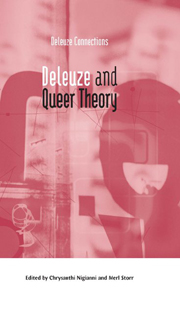Book contents
- Frontmatter
- Contents
- Introduction
- 1 On the Very Possibility of Queer Theory Claire Colebrook
- 2 Thirty-six Thousand Forms of Love: The Queering of Deleuze and Guattari
- 3 The Sexed Subject in-between Deleuze and Butler Anna Hickey-Moody and Mary Lou Rasmussen
- 4 Every ‘One’ – a Crowd, Making Room for the Excluded Middle
- 5 The Adventures of a Sex
- 6 Queer Hybridity
- 7 Prosthetic Performativity: Deleuzian Connections and Queer Corporealities
- 8 Unnatural Alliances
- 9 Schreber and the Penetrated Male
- 10 Butterfly Kiss: The Contagious Kiss of Becoming-Lesbian Chrysanthi Nigianni
- Notes on Contributors
- Index
1 - On the Very Possibility of Queer Theory Claire Colebrook
Published online by Cambridge University Press: 12 September 2012
- Frontmatter
- Contents
- Introduction
- 1 On the Very Possibility of Queer Theory Claire Colebrook
- 2 Thirty-six Thousand Forms of Love: The Queering of Deleuze and Guattari
- 3 The Sexed Subject in-between Deleuze and Butler Anna Hickey-Moody and Mary Lou Rasmussen
- 4 Every ‘One’ – a Crowd, Making Room for the Excluded Middle
- 5 The Adventures of a Sex
- 6 Queer Hybridity
- 7 Prosthetic Performativity: Deleuzian Connections and Queer Corporealities
- 8 Unnatural Alliances
- 9 Schreber and the Penetrated Male
- 10 Butterfly Kiss: The Contagious Kiss of Becoming-Lesbian Chrysanthi Nigianni
- Notes on Contributors
- Index
Summary
Is queer theory a reflection on what it means to be queer, or does the concept of queerness change the ways in which we theorise? On the one hand the concept of theory appears to be inextricably intertwined with the concept of the human: man is that rational animal possessed of a soul capable of intuiting the essential, or what truly is (Irwin 1988). On the other hand, the possibility of a true theory – a thinking without a normative image of thought – seems to be opened only after the death of God and the death of ‘man’ (Deleuze 1994: 109). For Deleuze, true thought and true theory – a real break with the normative image of ‘man’ – must include both the intuition of the ground from which sense, truth and problems emerge, and must fulfil the promise of transcendental inquiry, which has all too often fallen back upon a self or subject who subtends theory. Contrary to a popular idea of a simple anti-humanism Deleuze does not simply reject the intuition of essences, the eternal, genesis and grounds; on the contrary, his work is best understood as an argument in favour of a true or superior transcendentalism which would think beyond the residual humanism maintained both by forms of Kantian critique and by popular notions of community and interrogation (Deleuze 1994: 197).
While abandoning the idea of a metaphysical outside or ‘beyond’ which might ground metaphysics, post-Kantian thought has nevertheless maintained the possibility of renovating thought from within (O'Neill 1989).
- Type
- Chapter
- Information
- Deleuze and Queer Theory , pp. 11 - 23Publisher: Edinburgh University PressPrint publication year: 2009



